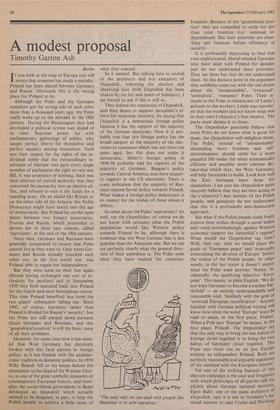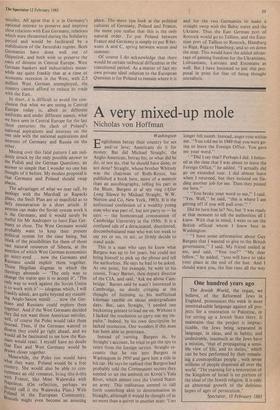A modest proposal
Timothy Garton Ash
Berlin
If you look at the map of Europe you will notice that someone has made a mistake. Poland has been placed between Germany and Russia. Obviously this is the wrong place for Poland to be.
Although the Poles and the Germans somehow got the wrong side of each other more than a thousand years ago, the Poles really woke up to the mistake in the 18th century. During the Renaissance they had developed a political system way ahead of its time. Supreme power lay with parliamentary gatherings of nobles, who sought perfect liberty for themselves and .perfect equality among themselves. Such was their respect for the rights of the in- dividual noble that the extraordinary in- stitution of liberum veto gave every single member of parliament the right to veto any Bill. It was unanimity or nothing. Such was their mistrust of central authority that they converted the monarchy into an elective of- fice, and refused to vote it the funds for a standing army. On an island like Britain or on the other side of the Atlantic this Noble Democracy might have lasted into the age of democracies. But Poland lay on the open plains between two hungry autocracies, Prussia and Russia, which proceeded to devour her in three easy courses, called 'partitions', at the end of the 18th century.
Since then, Germans and Russians have generally cooperated to ensure that Poles cannot live as they want to. Only when Ger- many and Russia actually knocked each other out, in the first world war, was Poland able to regain her independence.
But they were soon on their feet again (Russia having exchanged one sort of or- thodoxy for another) and in September 1939 they both marched back into Poland for the fourth and most horrendous course. This time Poland benefited less from the two giants' subsequent falling out. Since 1945, of course, Germany rather than Poland is divided for Russia's 'security', but the Poles are still pinned down between (East) Germans and Russians, and this 'geopolitical position' is still the basic cause of all their problems.
However, for some time now it has seem- ed that West Germany has decisively broken with this fatal pattern in foreign policy, as it has broken with the undemo- cratic tradition in domestic politics. In 1970 Willy Brandt fell to his knees before the monument to the dead of the Warsaw Ghet- to, in one of the great symbolic moments of contemporary European history, and there- after the social-liberal government in Bonn developed an Ostpolitik which* actually seemed to be designed, in part, to help the Polish people to achieve a little more of what they wanted.
So it seemed. But talking here to several of the architects and key executors of Ostpolitik, following the election and observing how little Ostpolitik has been shaken by the life and death of Solidarity, I am forced to ask if this is still so.
They defend the continuity of Ostpolitik, and their desire to support Jaruzelski's ef- forts for economic recovery, by saying that Ostpolitik is a democratic foreign policy because it has the support of the majority of the German electorate. Now it is pro- bably true that this foreign policy has the broad support of the majority of the elec- torate (a consensus which was not there ten years ago), but this does not make it democratic. Hitler's foreign policy in 1936-38 probably had the support of the majority of Germans. Reagan's policy towards Central America may.have majori- ty support in the US electorate. There is scant indication that the majority of Rus- sians oppose Soviet policy towards Poland. What makes a foreign policy democratic is its respect for the wishes of those whom it affects.
So what about the Poles' aspirations? Ah well, say the Ostpolitiker, of course we do not know with certainty what the Polish population would like Western policy towards Poland to be, although there is evidence that the West German line is less popular than the American one. But we can see perfectly clearly what the general direc- tion of their aspiration is. The Poles want what they have wanted for centuries: 'The only way we can deal with people like Heseltine is to arm ourselves.' freedom. Because of the 'geopolitical posi- tion' they are compelled to settle for less than total freedom (i.e_ national in- dependence). But their priorities are clear. They put freedom before efficiency or security.
It is profoundly depressing to find that even sophisticated, liberal-minded Germans who have dealt with Poland for decades just do not understand these priorities. They see them but they do not understand them. At this decisive point in the argument they suddenly come out with the old cliches about the 'unreasonable', 'irrational', 'unrealistic', 'romantic' Poles. Their at- titude to the Poles is reminiscent of Lenin's attitude to the workers: Lenin was convinc- ed that the workers did not know what was in their own ('objective') best interest. The party must dictate it to them.
The Ostpolitiker genuinely believe that most Poles do not know what is good for them; the Ostpolitiker will enlighten them. The Poles; instead of 'unreasonably' demanding more freedom and self- determination, should settle for a more peaceful life under the more economically efficient and possibly more tolerant dic- tatorship which they, the West Germans, will help Jaruzelski to build. Look how well the East Germans have done for themselves. I am sure the Ostpolitiker quite sincerely believe that they are thus acting in the ('objective') best interest of the Polish people, and genuinely do not understand that this is a profoundly anti-democratic approach.
But what if the Polish people could freely express their wishes through a secret ballot and voted overwhelmingly against Western economic support for Jaruzelski's regime? What would the Ostpolitiker say then? Well, they say, then we would place the goals of 'European peace' and 'eventually overcoming the division of Europe' before the wishes of the Polish people. In other words, in the last resort it doesn't matter what the Poles want anyway. Notice, in- cidentally, the qualifying adjective 'Euro- pean'. This means, in plain English: 'We do not want Germany to become a nuclear bat- tlefield' — an entirely understandable and reasonable wish. Similarly with the goal of 'eventual European reunification'. Anyone familiar with German political writing will know how often the word 'Europe' must be read to mean, in the first place, France. When a Pole says 'Europe' he means, in the first place, Poland. The Ostpolitiker say that the only way to bring the two halves of Europe closer together is to bring the two halves of Germany closer together. The Pope says there can be no just Europe without an independent Poland. Both are perfectly reasonable and arguable equations of the national with the European interest. Yet one of the striking features of this election campaign is the ease and frequeneY with which politicians of all parties talk ex- plicitly about German national interests. Egon Bahr, one of the main architects of Ostpolitik, says it is not in Germany's na- tional interest to take Cruise and Pershing
missiles. All agree that it is in Germany's national interest to preserve and improve
close relations with East Germany, relations which were threatened during the Solidarity Period and would be facilitated by a stabilisation of the Jaruzelski regime. Both Germanies have done well out of Ostpolitik, and both wish to preserve the oasis of detente in Central Europe. West German bankers and industrialists mean-
while say quite frankly that at a time of economic recession in the West, with 2.5 million West German unemployed, the country cannot afford to reduce its trade with the East.
In short, it is difficult to avoid the con- clusion that what we are seeing in Central Europe today is, albeit in different uniforms and under different names, what we have seen in Central Europe for the last three centuries: the clash of Poland's national aspirations and interests on the one side with the national aspirations and interests of Germany and Russia on the other.
Musing over this fatal pattern I am sud- denly struck by the only possible answer to the Polish and the German Questions, an answer so simple that I wonder no one has thought of it before. My modest proposal is that Germany and Poland should swap Places.
The advantages of what we may call, by analogy with the Marshall or Rapacki Plans, the Swift Plan are so manifold as to
defy enumeration in a short article. If anyone can make the Soviet system work it IS the Germans, and it would surely be
useful for Mr Andropov to have East Ger- many so close. The West Germans would Probably want to keep their present Political system for the time being, but think of the possibilities for them of those vast natural resources of Siberia, at the mention of which West German economists go misty-eyed ... now the Germans and Russians could exploit them together. Those Hegelian dogmas in which the theology abounds — 'The only way to Change the status quo is to accept it', 'The 9nly way to work against the Soviet Union is to work with it' — (dogmas which, I will frankly admit, are quite beyond my stumbl- ing Anglo-Saxon mind) ... now the Ger- mans and Russians could explore them
together. And if the West Germans decided they did not want those American missiles, Well, of course the Poles would take them
instead. Then, if the Germans wanted to disarm they could go right ahead, and we Would all be fascinated to see how the Rus- sians would react. I myself have no doubt that East and West Germany would be drawn closer together. Meanwhile, the Poles too would have what they want. Poland would be a free
country. She would also be able to con- summate an old romance, living tete-a-tete with France, like Mme Walewska with NaPoleon. (On reflection, perhaps we sr,hould call it the Walewska Plan.) With Poland in the European Community, birussels might even become an amusing
place. The more you look at the political cultures of Germany, Poland and France, the more you realise that this is the only natural order. To put Poland between France and Germany is simply to put B bet- ween A and C, spring between winter and summer.
Of course I do acknowledge that there would be certain technical difficulties in the transitional period. As a matter of fact my own private ideal solution to the European Question is for Poland to remain where it is
and for the two Germanies to make a straight swop with the Baltic states and the Ukraine. Thus the East German port of Rostock would go to Tallinn, and the Esto- nian port of Tallinn to Rostock, Hamburg to Riga, Riga to Hamburg, and so on down the map. This would have the added advan- tage of gaining freedom for the Ukrainians, Lithuanians, Latvians and Estonians as well. But I have hesitated to put this pro- posal in print for fear of being thought unrealistic.







































 Previous page
Previous page